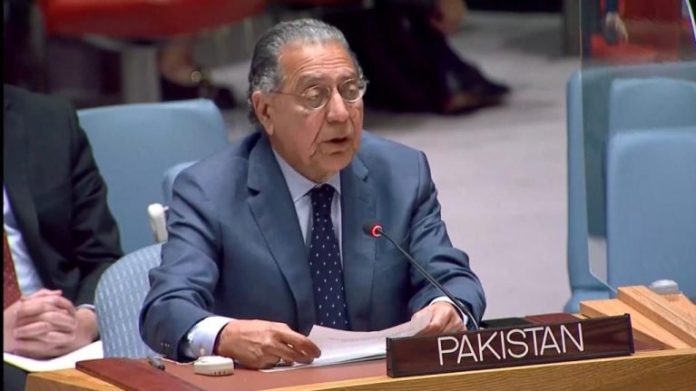A senior Pakistani diplomat has brought into the sharp focus of the world community the absence of the principle of burden-sharing as developing countries have been hosting the majority of refugees and displaced persons, with over a million Afghan refugees still in Pakistan.
“Pakistan has hosted over 5 million Afghan refugees over 40 years,” Ambassador Munir Akram told a session of the UN Economic and Social Council (ECOSOC) on humanitarian affairs on Tuesday.“Even today, we have over 1.4 million registered refugees, another 1 million unregistered and thousands who are entirely un-documented, the Pakistani envoy said.
At the same time, he made it clear that Pakistan will apply its laws regarding all aliens who are illegally in the country. “We also hope that now that conflict has ended in Afghanistan, the 1.4 million registered Afghan refugees will be repatriated soon under a fully-funded UN Plan, as promised years ago,” Ambassador Akram added.
The world’s humanitarian crisis, he said, is caused by the growing impacts of climate change, proliferating conflicts, and the accompanying violations of international humanitarian law.In this regard, he underlined the importance of early warning systems to mitigate the impact of climate disasters.
“Following the 2022 floods, Pakistan has developed capabilities to predict disasters up to 10 months in advance, with projections across all domains.“We have launched a specific National Disaster Management Authority (NDMA) app for public guidance and are prepared to share our low-cost models for global application,” he said.
The Pakistan envoy called for increased humanitarian and climate finance, citing the Loss and Damage Fund, for which $800 million were initially pledged, but which he said requires significantly more funding.He also emphasized the importance of the Charter on Finance for Managing Risks, launched at CoP28, and the need for policy coherence between climate adaptation, disaster risk reduction, and humanitarian response frameworks.
Referring to Pakistan’s Resilient Recovery, Rehabilitation, and Reconstruction Plan (4RF) post-2022 floods, Ambassador Akram noted that while pledges of $10.9 billion were made by the international community, only $6.5 billion has been realized, leaving $4.4 billion pending and the resilience component unfunded.
He commended the UN Office for the Coordination of Humanitarian Affairs (OCHA) and its partners for their response under challenging circumstances but noted a chronic funding gap that has increased by 16%. He urged member states to establish mechanisms for adequate, predictable, and timely funding.Ambassador Akram called for an integrated approach involving peace enforcement, peacekeeping, and peace-building to address the root causes of conflicts.
Highlighting the grave humanitarian crisis in besieged Gaza and violations of international humanitarian law, he demanded accountability for war crimes and genocide through appropriate judicial mechanisms to end impunity.









